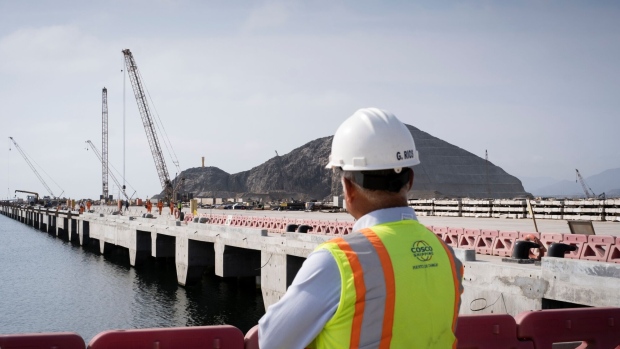Mar 26, 2024
Chinese Port in Peru Faces Surprise Challenge to Business Model
, Bloomberg News

(Bloomberg) -- China’s $1.3 billion port in Peru is facing a surprise challenge that could upend its business model, just months before its inauguration later this year.
Peru’s port authority said last week that Cosco Shipping’s Chancay port was mistakenly granted exclusivity over the services to be offered on site. Now, the regulator is saying the facility should be open to other companies offering services such as loading and unloading shipping containers.
“Evidently, this would alter any business plan,” said Francisco Roman, a former senior attorney for DP World in Peru, which exclusively operates the largest container terminal in the country.
The Chancay port, set to open in November when Peru hosts the Asia-Pacific Economic Cooperation conference, is a lightning rod for US-China trade tensions in South America. US officials have criticized Peru for allowing a state-owned Chinese company to build such a large infrastructure project in the country, while Peruvian authorities have countered that US firms aren’t willing to make the same kinds of investments in the region as Beijing.
Once operational, the port facility north of Lima could transform South American trade by creating a direct line from Chancay to Shangai.
Roman said exclusive deals are typical in Peru, allowing port operators to recover their investments by charging for the use of infrastructure. But he added that Chancay is legally different from other Peruvian ports because it was built from scratch as a private entity, rather than a public port being given as a concession to private operators, as was the case for DP World’s Callao facility.
Transportation and Communications Minister Raul Perez Reyes said the Chancay port will still be inaugurated in November and that the government is looking to change regulations as a way to solve the issue.
“We are working to have this exclusivity framework, which we think is reasonable,” Perez Reyes said, according to newspaper Gestion.
Cosco criticized Peru’s move on Monday, saying that securing the exclusivity over services was a “relevant aspect” behind the company’s decision to fund the port. It added that Peru’s challenge hurts the investment climate in the country.
©2024 Bloomberg L.P.





